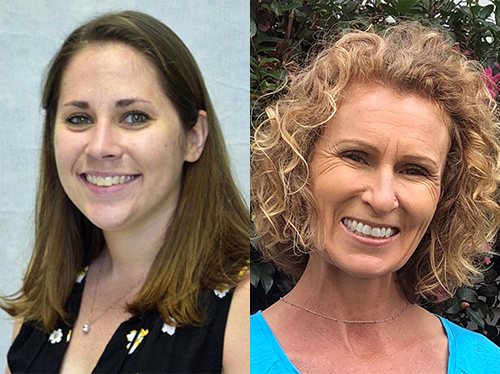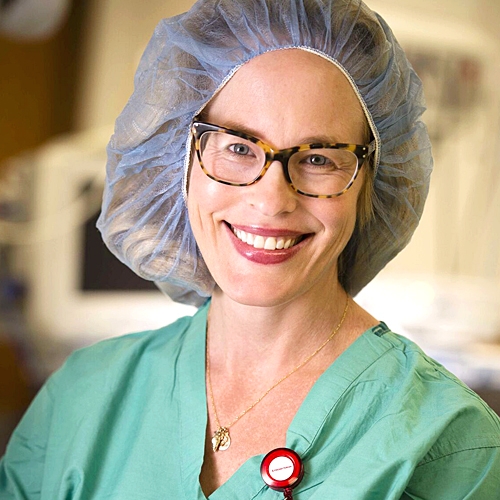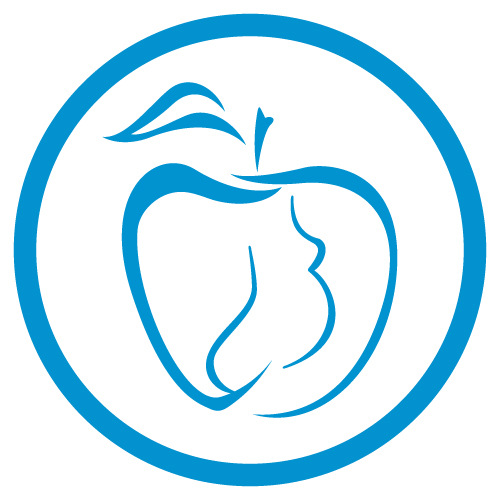 IBCLC Detailed Content Outline: Pathology / Maternal Focused CERPs - Section III B
IBCLC Detailed Content Outline: Pathology / Maternal Focused CERPs - Section III B
Access CERPs on Pathology / Maternal for the IBCLC Detailed Content Outline recertification requirements. On-demand viewing of the latest Pathology / Maternal focused IBCLC CERPs at your own pace.
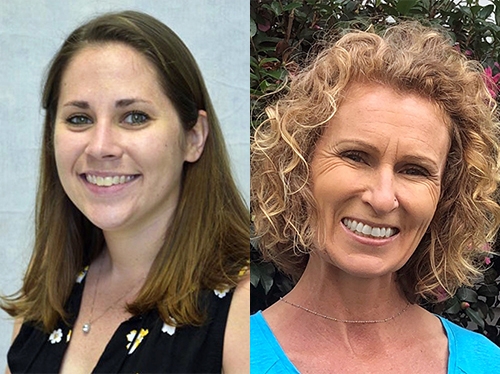

Hope has always been the type of person to dive head-first into the deep end (literally - she learned to swim before she was 2!). Hope became an International Board Certified Lactation Consultant (IBCLC) in 2017, completed her PhD in nutritional biochemistry in 2018 at NC State University, and became a Registered Dietitian Nutritionist (RDN) in 2020.
In addition to owning and operating Hope Feeds Babies in Rock Hill, SC, Hope is employed full time at Winthrop University in the Department of Human Nutrition overseeing the Certificate in Medical Lactation and running a research lab that focuses on helping mothers to reach their infant feeding goals, improving access to human milk, and analyzing the nutritional content of human milk. As an IBCLC, Hope has a passion for connecting with mothers to help them to reach their individual feeding goals and advocacy for maternal health. As an RDN, Hope loves to support parents in feeding their children, whether that is traditional solids, baby-led weaning, or blenderized tube feeds.
Karin always knew that helping people would guide the course of her career. Karin’s professional path demonstrates this passion as she pursued a BA in psychology from Villanova University, a Master’s in Nutrition Education from Immaculata University, and is currently in the latter stages of her dissertation work towards a PhD in Health Education and Promotion from Walden University. In the past 20 years, Karin has sought opportunities that allow her to gather experience in various settings. While earning her Masters in Nutrition Education, she worked as a counselor and nutrition therapist at the world renown Renfrew Center in Philadelphia, PA. It was here that Karin adopted her view that an individual’s relationship with food and body are critical to change and sustain physical and mental health.
Sharing this approach with future health-minded individuals prompted Karin to begin teaching at Winthrop University, where she has taught for the past seven years courses related to health and nutrition. During this time, Karin continues her own education through the pursuit of Doctorate in Health Education and Promotion from Walden University. Her dissertation focuses on online faculty perceptions of college student mental health concerns and if these perceptions predict the likelihood of a mental health service referral.
Anorexia nervosa (AN) is a clinical condition characterized by restriction of energy intake, fear of gaining weight or becoming fat, and body dysmorphia. As pregnancy and subsequent lactation are associated with changes in weight and body shape, it is important to consider the implications of a pre-existing or current diagnosis of AN during the postpartum period. The research examining the impact of body changes during pregnancy on individuals with a history of AN has mixed results; some show AN symptoms regress during pregnancy, while other results show a resurgence of AN symptoms. While there is limited evidence of the impact of AN on milk production, milk composition, and breastfeeding experiences of the parent, the evidence that we do have can help guide lactation consultants when providing care for the dyad during the fourth trimester. In this presentation, participants will learn about the diagnostic criteria and screening tools for AN, the impact of energy restriction and AN on milk supply and composition, and will participate in a exploration of the implications AN may have on dyad care.

View Details / Enroll


Carmela is a family medicine MD, bachelor´s degree in Public Health Education, and IBCLC since 2005. She is also a BFHI Evaluator and the co founder and past president of the Spanish Lactation Consultant Association (AECCLM). She works in a private Family Wellness Clinic, Raices, as person in charge of the lactation program, which includes two IBCLCs attending breastfeeding families and an extensive offer of breastfeeding training for health care professionals and breastfeeding peer counsellors. The team has trained over three thousand doctors, midwives and nurses from both the Spanish National Health Service and the private sector in Spain. She is a frequent lecturer at national conferences, and has also lectured internationally, both on-site and online. She is the author of several scientific papers on breast pain, mastitis and tongue tie. She is also the author of a breastfeeding/parenting book, “Amar con los Brazos Abiertos” (To Love with Open Arms). She is married to Carlos and they homeschool their four children.
Topic: Assessment and Management of Mastitis - [View Abstract]
Topic: Getting Milk Production off to a Good Start - [View Abstract]
Topic: Management of Chronic Breast Pain: Holistic Approach - [View Abstract]
Topic: The Art and the Science: A Critical Look at the Physiology and Management of Mastitis - [View Abstract]
When a breastfeeding mother consults because of chronic, deep breast pain, we feel weak at the knees. Often these mothers have been to several specialists and nothing has worked for them. Is it mastitis? Thrush? Referred pain from an inadequate latch? Emotional issues? Or is it all of the above, and even more? In this presentation we will learn to do an in-depth clinical history and to use an holistic model for a systematic management of chronic breast pain, so we can offer these mothers more efficient solutions – and better counselling.

View Details / Enroll


Tamara Drenttel Brand holds an MA in Near Eastern Studies from the University of Arizona and a Master’s in Public Health (MPH) from the American University of Beirut. She spent 10 years in the Middle East, where she worked as a public health practitioner, infant and maternal health consultant and an IBCLC. She has supported breastfeeding dyads from all over the world both in private practice and as a volunteer. In 2011, she founded and still actively facilitates “Mama 2 Mama Beirut Breastfeeding Support,” the largest breastfeeding peer support network in the Middle East (currently at 25k+ members). Additionally, she founded Galactablog, a professional group for lactation specialists and those aspiring-to-be (currently at 4.7k+ members) and has authored several articles for La Leche League’s monthly leader publications in both the Middle East and Ireland.
She is currently an international speaker on the topics dealing with breastfeeding in the Middle East, innovative lactation teaching strategies, working in resource-scarce settings, providing culturally sensitive lactation support, developing and implementing peer counselor training programs, mast cell disease and other related topics. Due to her own chronic health conditions, she has a special interest in educating others about mast cell disease and supporting those with chronic illnesses. She currently resides in a seaside village in Ireland with her family.
Topic: Contextualizing Breastfeeding in Lebanon - [View Abstract]
Topic: Lactation Education Outside the Box: Innovative Teaching Strategies to Engage Your Audience - [View Abstract]
Topic: Mast Cell Diseases and Lactation Care in the Post-Covid Era - [View Abstract]
Topic: Providing Culturally Sensitive Support for Breastfeeding Muslim Families - [View Abstract]
Topic: Reflections on a Breastfeeding Peer Counselor Program in Lebanon: Lessons Learned and Looking Forward - [View Abstract]
Mast cell diseases remain highly misunderstood and underdiagnosed conditions, even among medical professionals. Patients often take years to be diagnosed due to the range of symptoms and effects that such diseases can manifest. Recently, emerging evidence-based research has found links between mast cell disease(s) and Long COVID, theorizing that COVID-19 can exacerbate existing and undiagnosed mast cell diseases and that the SARS-CoV-2 virus itself could activate mast cell diseases. This raises the possibility that mast cell diseases will become more prevalent, requiring medical professionals, including lactation specialists, to be aware of their impacts and to provide the specialized care and support that such conditions require.
This presentation will provide participants with an overview of the different types of Mast Cell Diseases, symptoms, triggers and treatments. It will discuss associated chronic conditions and will highlight potential complications that such diseases can present for birth and breastfeeding. It will also provide resources to help participants determine lactation risk and compatibility with Mast Cell disease treatments and medications. Finally, this presentation will equip participants with the knowledge and practical tools to improve lactation support and care for clients with Mast Cell Disease.

View Details / Enroll

Maternal & Infant Assessment for Breastfeeding: Essential Concepts for Midwives

Barbara Wilson-Clay became a La Leche League Leader in 1982. She certified as an IBCLC and entered private practice in Austin, Texas in 1987. Barbara was named a Fellow of the International Lactation Consultant Association in 2008. She recently retired from her practice, which specialized in difficult breastfeeding situations. With a client load of 400-450 visits yearly, Barbara garnered a wealth of clinical and counseling experience and a trove of clinical teaching photos. In partnership with Kay Hoover, she created The Breastfeeding Atlas, which was translated into Chinese in 2019 by Fudan University Press. A Korean translation will be published in September 2020.
Barbara has been a citizen advocate for breastfeeding in the Texas legislature and helped pass a landmark law protecting breastfeeding rights. She is one of the co-founders of the non-profit Mothers Milk Bank at Austin, and retired as Vice President of the Board of Directors in 2010. She continues to serve on the Advisory Board. Barbara's research and commentaries have appeared in the Journal of Human Lactation, Archives of Disease in Childhood, the International Breastfeeding Journal, and others. She has served on various editorial review boards and contributed chapters to several lactation textbooks.
Topic: Looking Both Ways: Taking Wisdom from the Past Into the Future - [View Abstract]
Topic: Looking Closely at The Baby - [View Abstract]
Topic: Maternal & Infant Assessment for Breastfeeding: Essential Concepts for Midwives - [View Abstract]
Infants born at term following an uneventful birth generally require no breastfeeding interventions aside from a supportive environment. However, even in populations of women who are well-motivated to breastfeed, fully one third of infants demonstrate sub-optimal breastfeeding behavior in the first week postpartum. Risk factors have been identified that predict which mother-infant pairs may require extra assistance to protect the option to fully breastfeed once conditions stabilize. Careful assessment of the dyad helps identify who will need the most help. Such assessment is necessary to protect the infant from excessive weight loss and, because the calibration of milk supply is a time-sensitive event, serves to protect the potential for a full milk supply. Midwives must be familiar with new research that recommends that, in the presence of risk factors, milk expression should begin in the first hour after birth, with expressed colostrum being delivered to the infant by spoon or cup.
View Details / Enroll
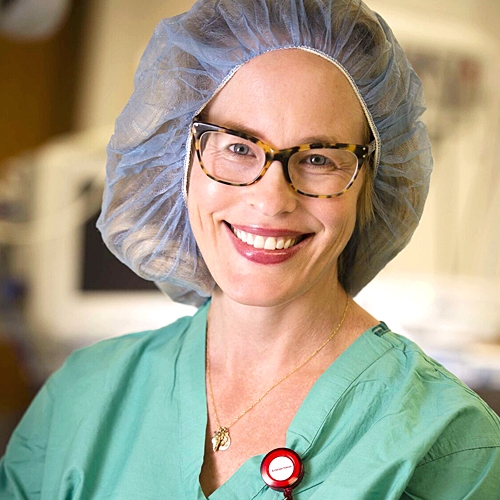

Katrina B. Mitchell, MD, IBCLC, PMH-C is a breast surgeon, lactation consultant, and perinatal mental health provider. Her surgical practice includes the care of women with breast cancer and benign breast disease. She sees runs a daily breastfeeding medicine practice, treating patients for a wide variety of lactation concerns ranging from hypolactation to nipple trauma. Additionally, she provides medication management and support for women impacted by perinatal mood and anxiety conditions.
Dr. Mitchell lectures locally, nationally, and internationally on the intersection of lactation and surgery, and has authored book chapters, clinical care protocols, and journal articles on the topic. She is the creator of the physicianguidetobreastfeeding.org, an evidence-based resource for breastfeeding families and the communities that support them. Dr. Mitchell resides in Santa Barbara, California and practices at the Ridley Tree Cancer Center at Sansum Clinic. She enjoys reading, traveling, and spending time with her son camping at the beach. She can be reached at physicianguidetobreastfeeding.org.
Topic: Performing Physical Breast Assessment - [View Abstract]
The purpose of this presentation is to first review basic components of the breast physical exam, and then transition into the management of challenging maternal complications of lactation. We also briefly will review breast imaging that may be required for diagnostic purposes in this setting.

View Details / Enroll

Persistent Pain During Breastfeeding - A Challenge in Lactation Counseling

Alexandra Glass is a gynecologist/ obstetrician and an International Board Certified Lactation Consultant working in Hanover, Germany, where she lives with her family. Alexandra is the Vice President of BDL Lactation Consultant Association. She speaks at Local, National and International conferences and she teaches preparatory courses for the IBCLC exam. She is the mother of two daughters, who were both breastfed.
This presentation will give an overview of the reasons that can cause painful breastfeeding and how we can intervene either via breastfeeding management or medically.
The reasons might be
- poor latch
- problems with sucking, like tongue tie or other anatomical issues, also nipple confusion
- vasospasms
- infections, mastitis
- Mammary Constriction Syndrome
- injuries or medical conditions of the skin, such as psoriasis, dermatoses, eczema
- oversupply
- plugged ducts
- incorrect pumping or hand expression
- allodynia/functional pain
- psychological and emotional aspects
Important aspects concerning breastfeeding management and counselling and possible therapeutic interventions will be discussed as well as the impact of painful breastfeeding on the breastfeeding dyad and the whole family.

View Details / Enroll

View Details / Enroll

Popular Diet Trends: Impact and Safety During Lactation

Meghan McMillin holds a Master’s Degree in Human Nutrition from the University of Illinois at Chicago. She has been a Registered Dietitian Nutritionist (RDN) since 2013 and became an International Board Certified Lactation Consultant (IBCLC) in 2019.
Meghan spent 5 years working clinically in the NICU, pediatric floor and women’s units of a local hospital. In 2019, Meghan started her own private practice and consulting company, Mama & Sweet Pea Nutrition, with a focus on postpartum and infant care. The mama to two young kids with food allergies, helping other families manage food allergies, whether it’s while breastfeeding, during the introduction of solids, or later in childhood, is her passion.
Meghan is a member of the International Lactation Consultant Association and the United States Lactation Consultant Association. She enjoys sharing her knowledge through social media and public speaking. Meghan is the coauthor of the eBook What To Eat When Your Baby Can’t Tolerate Milk, Soy, or Egg Protein; Nutrition guidance for avoiding milk, soy, and/or eggs while lactating.
Meghan has presented both nationally and internationally including for GOLD learning, the National WIC Association and the Academy of Nutrition and Dietetics. In 2020, Meghan was awarded the Emerging Professional in Women's Health Award from the Women's Health Dietetic Practice Group of the Academy of Nutrition and Dietetics.
Topic: Popular Diet Trends: Impact and Safety During Lactation - [View Abstract]
Diet culture is pervasive and it seems everyday brings about a new popular trend or style in how, when, or what to eat. The postpartum period often brings about an incredible amount of pressure to lose weight or “bounce back” to pre-pregnancy body shape. It’s no wonder many turn to popular diet trends with the promises of quick weight loss. However, with a lack of research in the lactating population, there remains concern regarding both the effect these diets may have on milk supply and their safety. This presentation will provide lactation professionals with the information they need to have informative discussions with their clients about popular diet trends.

View Details / Enroll


Diana West is an IBCLC in private practice. She is the co-author of “Sweet Sleep: Naptime and Nighttime Strategies for the Breastfeeding Family,” the 8th edition of La Leche League International’s “The Womanly Art of Breastfeeding,” “The Breastfeeding Mother’s Guide to Making More Milk,” the clinical monograph “Breastfeeding After Breast and Nipple Procedures,” and ILCA’s popular “Clinician’s Breastfeeding Triage Tool.” She is the author of the “Defining Your Own Success: Breastfeeding After Breast Reduction Surgery.” She is on the Editorial Review Board for the “Journal of Clinical Lactation,” a La Leche League Leader and the Director of Media Relations for La Leche League International. She has a bachelor’s degree in psychology and is the administrator of the popular BFAR.org, LowMilkSupply.org, and LactSpeak.com websites. She lives with her three sons and one husband in the picturesque mountains of western New Jersey in the United States.
Topic: Mothers Speak Out: Top Five Traits of a Great Lactation Consultant - [View Abstract]
Topic: Mothers Speak Out: Top Five Traits of a Great Lactation Consultant - [View Abstract]
Topic: Postpartum Nipple Pain: Causes, Treatments, and Empathy - [View Abstract]
Topic: Sleep Training: History, Research, and Outcomes - [View Abstract]
Topic: Sweet Sleep: Bedsharing for Breastfeeding Mothers and Babies - [View Abstract]
In a vivid (and sometimes graphic!) presentation of photos contributed by lactation colleagues around the world, a wide variety of nipple pain causes, treatments, and counseling strategies are explored and discussed.
View Details / Enroll

Preventing the Plunge: Why the First 2 Weeks are Crucial for Breastfeeding Duration.

Cindy Leclerc and Jana Stockham are Registered Nurses and IBCLCs with over 20 years experience helping families get started with breastfeeding. In addition to hands on care, Cindy and Jana use technology to support families through their website (cindyandjana.com), online prenatal breastfeeding classes (simplybreastfeeding.ca) and iPhone app, NuuNest. Cindy is a strong believer in mother-to-mother support, helping to facilitate breastfeeding and postpartum depression support groups. She is intrigued by all things online and actively uses social media to promote breastfeeding. Jana has been trained as a Baby Friendly assessor and helped to coordinate the first Baby Friendly designation in Saskatchewan. She has a passion to help families with new babies and facilitates a group for breastfeeding moms.
Topic: Meeting your breastfeeding goals - [View Abstract]
Topic: Preventing the Plunge: Why the First 2 Weeks are Crucial for Breastfeeding Duration. - [View Abstract]
The majority of women begin breastfeeding at birth. Within the first 6 weeks, however, breastfeeding rates fall dramatically. To help women hang in with breastfeeding beyond the first weeks, we must first understand why they struggle. Learn what the research is saying and what you can do in your practice to help women meet their breastfeeding goals. IBCLC’s who specialize in the early weeks of breastfeeding will share case examples based on over 20 years of working with breastfeeding families.

View Details / Enroll

View Details / Enroll

Primers for Nutritional Counseling in Pregnancy: Lessons from Gestational Diabetes

Dr. Teri Hernandez is the Associate Dean for Research and Scholarship in the College of Nursing and an Associate Professor of Medicine and Nursing at the University of Colorado. Over 19 years at CU, she has developed a program of research exemplified by the execution of carefully controlled clinical studies focused on nutrition, metabolic health, and early life exposures. The goal of these studies is to illuminate ways to improve the lives of women, infants and their families using a multidisciplinary team science approach. Teri is a cardiac nurse by training. She has a dedicated commitment to understanding insulin resistance as both an adaptation and as pathology. Her research focuses on diabetes/obesity, pregnancy, and fetal growth, with an emphasis on how nutrition and metabolism influence these conditions. She and her research team (Infant GOLD, Investigations in the Gestational Origins of Lifelong Development) have a research program focused on in-utero programming influences and through this platform, she is committed to training high-caliber clinical investigators. Dr. Hernandez is an educator in the graduate school at CU, serves as Director for the Colorado Clinical and Translational Research Institute Early Life Exposures Research program, and is a Pediatric Nurse Scientist at Children’s Hospital Colorado.
Nutrition has a powerful and lasting influence on maternal and fetal outcomes in pregnancy. In gestational diabetes (GDM), nutrition therapy remains the primary approach to treatment and we now understand that lessons from nutrition in GDM may be applied to all pregnancies. Recent data underscore metabolic similarities in patterns of glycemia and lipemia between diet-controlled GDM and maternal obesity without GDM. This highlights an opportunity to more thoughtfully target women with obesity outside of GDM, where macrosomia rates are high, for treatment with nutrition. The importance of good nutrition for all pregnant women was recently highlighted by data demonstrating strong associations between fasting and postprandial triglycerides and neonatal adiposity outside of GDM, further supporting a role for targeting these nutrition sensitive indicators. Currently, evidence does not support one particular nutritional approach to treatment of GDM. The quality of the available evidence is poor due to high heterogeneity. However, a recent meta-analysis across 18 RCTs and 8 diet patterns demonstrated that any modification which improves from intake at GDM diagnosis is effective in reducing fasting and postprandial glucose, and lowering infant birthweight. The goal is balanced, affordable and culturally acceptable nutrition for women with GDM, extending to all pregnancies.




